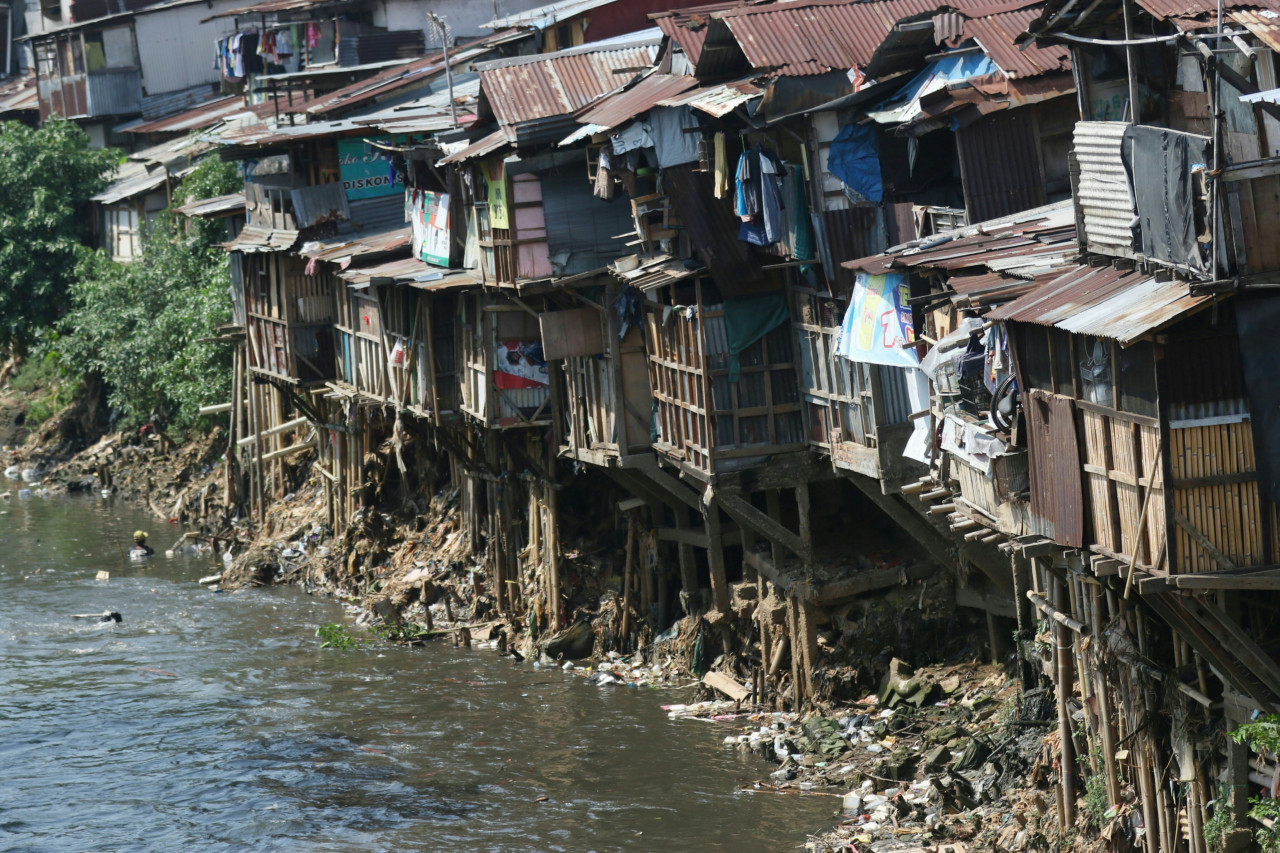Popular Reads
Top Results
Can't find what you're looking for?
View all search resultsPopular Reads
Top Results
Can't find what you're looking for?
View all search resultsAre democracies better at reducing poverty?
Democratic Indonesia continues to provide evidence that democracy, development and stability are complimentary, or are in a virtuous cycle.
Change text size
Gift Premium Articles
to Anyone
 Hanging on: Many residents of Jakarta do not realize that the capital still has homes like these in the city. Despite sustainable economic growth for more than two decades, Indonesia currently has 26.43 million poor people. Due to the COVID-19 pandemic, the number of poor people could double by the end of this year (JP/Dhoni Setiawan)
Hanging on: Many residents of Jakarta do not realize that the capital still has homes like these in the city. Despite sustainable economic growth for more than two decades, Indonesia currently has 26.43 million poor people. Due to the COVID-19 pandemic, the number of poor people could double by the end of this year (JP/Dhoni Setiawan)
Are democracies better in reducing poverty than autocracies? In addressing this question, let me make three main points.
First, poverty is a broad and relative notion: it cannot be measured by an economic benchmark alone, like the UN’s official 1.90 cents a day criteria for the “extreme poverty” line. There is now the idea of “multidimensional poverty”, developed by the Oxford Poverty and Human Development Initiative (OPHI) and released by the United Nations Development Program.
This makes poverty a broader concept that takes into account adds indictors other than just income level, such as malnutrition, lack of healthcare, as well as limited access to clean water, electricity, education and work opportunities.
These additional measures are part of what is known as human security. So what matters in poverty reduction is not reducing the number of people below a certain level income, but increasing human security for people. Even if a country achieves growth and reduces poverty by counting the income, it does not mean it has really reduced poverty.
Second, there is no question that democracies are not necessarily better in poverty reduction.
In Asia, both China and India have done well in poverty alleviation, despite very different political systems. According to the Pew Research Center, between 2001 and 2011, the poverty rate in China declined to 12 percent while in India it fell to 20 percent. This meant China lifted 356 million of its people out of poverty, while India did the same for 133 million of its own citizens.
By this count, China did and continues to do better than India. But India, according to the Oxford Institute led the world in lifting as many as 270 million people out of multidimensional poverty between 2005-6 and 2015-16.
India also provides robust evidence that democracies do well in addressing famine.
Independent and democratic India has been able to avoid famines that recurred throughout the British Raj, the last of which killed 2-3 million people in Bengal in 1943. As India’s economic noble laureate Amartya Sen, argues, democracies are less likely to suffer devastating famines.
Some electoral democracies have not done as well, such as in Africa, although this has much to do with their weak institutional capacity, rather than democracy per se.
At the same time, many authoritarian countries have done poorly in poverty reduction. North Korea is a striking example. And let us not forget, poverty levels increase when a country slides into authoritarianism. Thus, Myanmar after the 1962 military coup went from being the rice bowl of Asia to being one of the world’s poorest nations.
I am reminded by the famous controversy about the link between democracy and development in the 1990s. There was an argument that the “East Asian economic miracle” happened because of authoritarian rule in key countries and territories: namely South Korea, Taiwan, Indonesia (under Soeharto), and Singapore, etc. China would soon join this group. Singapore’s then prime minister Lee Kuan Yew held the view that democracy can be detrimental to development, while Philippine president Fidel Ramos pointed out that Philippines was under a dictatorship for decades, yet achieved little growth. Under Ramos, Philippines actually did quite well in economic growth.
So did Indonesia under the authoritarian regime of Soeharto. But it would also continue to do well after its democratic transition.
Democratic Indonesia continues to provide evidence that democracy, development and stability are complimentary, or are in a virtuous cycle. I have discussed this “trifecta” in my 2014 book Indonesia Matters, and discussed in The Jakarta Post article.
The cases of Indonesia or India beg the question: Is it preferable to live under a system that combines democracy, development and stability, as opposed to a system that provides only stability and development (perhaps at a little faster rate) but no democracy?
Authoritarian regimes with good institutions and governance may reduce poverty faster (again, depending on what one means by poverty), but this also comes at a cost of loss of civil liberties, limited mobility of people across different states and urban centers.
My third point is that democracy is certainly not sufficient for development and poverty reduction. Aside from institutional capacity, good governance also matters. On this score, Singapore and China have done well in poverty reduction. But good governance ultimately requires democracy.
As noted democracy expert Larry Diamond notes: “Good governance involves the capacity and commitment to act in pursuit of the public good, transparency, accountability, citizen participation and the rule of law. Bad governance prevents the accumulation of the financial, physical, social and political capital necessary for development. Democracy should provide a corrective to bad governance by holding corrupt, unresponsive or ineffectual leaders to account and enabling citizens to participate in making policy.”
So here is my big conclusion: There is no excuse to justify authoritarian rule in the name of poverty alleviation.
Finally, there is a new danger now. A vicious cycle is emerging between the COVID-19 pandemic, poverty, and loss of democracy. COVID-19 has increased the level of poverty worldwide while reducing democratic space.
This is worrisome. In October 2020, the World Bank predicted that thanks to the pandemic, global extreme poverty would rise in 2020 for the first time in over 20 years, thus increasing the number of people in extreme poverty by 88 million to 150 million by 2021. This means the extreme poverty will remain between 9.1 percent and 9.4 percent of the world’s population in 2020, instead of dropping to 7.9 percent had there been no pandemic. It also noted that the new poor will be disproportionately in countries with already high poverty rates.
Add to the more severe effect of the pandemic on poor people and minorities. A study of the impact of COVID-19 in five of the largest democracies: US, India, Brazil, Philippines and Indonesia, by Joshua Kurlantzick of the Council on Foreign Relations concluded that the pandemic has killed more poor people and minorities per capita than middle class or rich people in these countries. This, along with poor government response, has reduced the number of wage-earners for the affected families, making their future recovery much more challenging.
While poverty rates rise, democratic space is being reduced. According to an Asia Society study, people in Southeast Asian states are accepting, and even demanding stronger state intervention, which they believe will better address the pandemic. Giving more authority to governments even for handling the pandemic always carries the risk of abuse and overall restriction of freedom, especially in a region known for its “strong” and authoritarian regimes.
This is especially alarming in view of the worldwide reversal of democratization that started well before the pandemic.
***
The writer is UNESCO chair in Transnational Challenges and Governance at American University, Washington, DC. This text is based on his speech in the 14th Bali Democracy Forum, Dec. 9, 2021.










